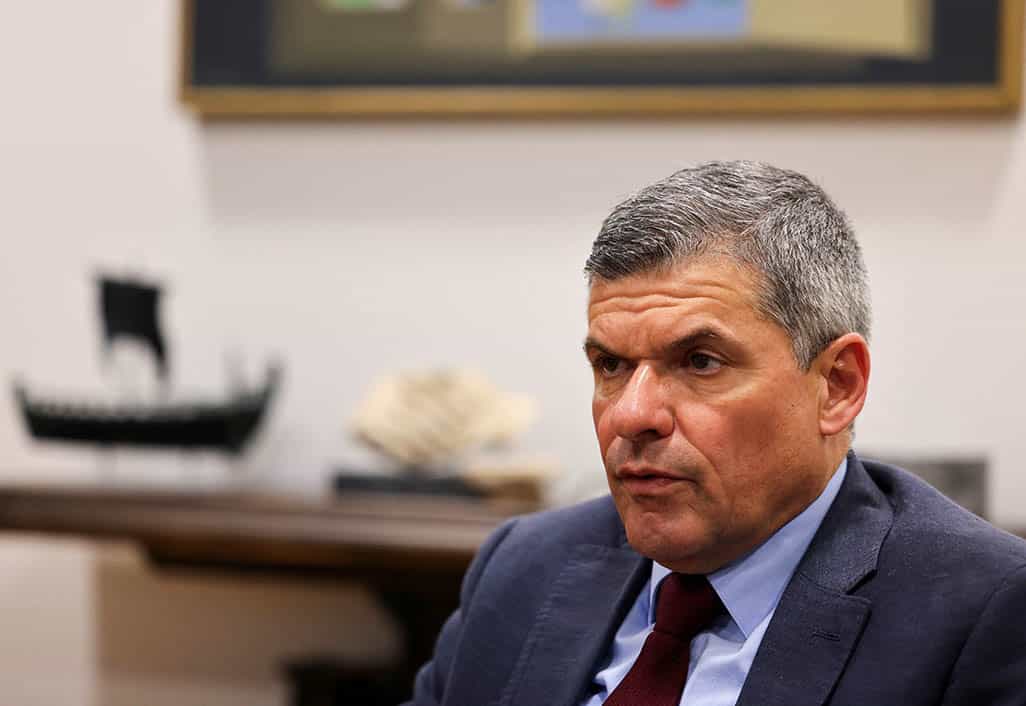Close cooperation between the government and businesses is essential, said Energy Minister George Papanastasiou at the 63rd general assembly of the Limassol Chamber of Commerce and Industry (Evel).
This cooperation, the minister explained, is needed to achieve Cyprus’ shared goals of green and digital transformation, stronger competitiveness, and an upgraded international image.
In the presence of Justice Minister Marios Hartsiotis, Deputy Minister of migration Nikolas Ioannidis, MPs, local officials and business representatives, Papanastasiou praised Limassol’s active business community and its decisive role in the country’s economic progress.
He said that Limassol is moving dynamically towards a new era of growth and extroversion, supported by modern infrastructure and strategic planning that strengthen its role as a key economic, maritime and tourism hub.
The ceremony began with a minute’s silence in memory of prominent businessman Kostakis Lefkaritis, who passed away on October 20 at the age of 82.
Furthermore, Papanastasiou reaffirmed that the Government remains a steadfast supporter of Cypriot business, implementing targeted policies to enhance innovation, manufacturing and energy efficiency.
He noted that €226 million has been secured under the THALEIA programme for the 2021–2027 period, along with €137 million from the EU Recovery and Resilience Mechanism and the REPowerEU Plan, to strengthen entrepreneurship and industry.
So far, he said, €101.2m in grants have been disbursed, including €88.9m through THALEIA and €12.3m through the recovery and resilience plan, supporting actions related to new entrepreneurship, energy upgrades in housing, competitiveness of small and medium-sized enterprises (SMEs), digitalisation and energy efficiency investments.
At the same time, he added that through disciplined fiscal management, the government “remains ready to support businesses both in crises and emergencies,” referring to the recent devastating fire in mountainous Limassol as an example.
Addressing energy costs, Papanastasiou stressed that reducing prices remains vital for competitiveness. He said the commercial operation of the competitive electricity market marks a significant step forward, while full utilisation of European funds to improve energy efficiency and storage systems remains a top priority.
Moreover, referring to the island’s 14 industrial areas, which host around 950 businesses, the Minister said their upgrading and modernisation remain a core priority, in cooperation with local authorities, chambers and industrial associations.
In 2025 alone, he noted, projects worth €8m were promoted, including the completion of the Vasilikos energy and industrial area.
In Limassol, he continued, works are progressing for a kindergarten and childcare centre in the 3rd industrial area of Ypsonas, expected to be operational in 2026, while asphalt and sidewalk improvements worth €750,000 are being carried out in Ypsonas and Agios Athanasios.
Plans for 2026 include the construction of a second entrance and exit to the two industrial areas to improve traffic flow and emergency access, as well as a new transport route for workers in the Ypsonas zone.
Papanastasiou stressed that “our close cooperation is essential for achieving our shared goals,” adding that if Cyprus is to realise its green and digital transformation, “we must work collectively and in a coordinated manner.”
He also assured that his Ministry “will continue to stand as a supporter and ally in your initiatives.”
In his off-text remarks, the Minister referred to Cyprus’ upcoming Presidency of the Council of the EU, beginning January 1, 2026, noting that his Ministry will chair the competitive electricity market councils.
In this context, Cyprus’ focus, he said, will be on enhancing the competitiveness of European industry, which depends heavily on achieving greater energy autonomy, a difficult goal given Europe’s limited resources.
While reaffirming that the goal remains a green transition, he underlined that Europe must not reject other energy forms.
“We do not have the luxury to reject any form of energy or technology,” he said, pointing to natural gas and nuclear energy as complementary to renewables.
He added that one of the key pillars of the Presidency will be strengthening European energy networks to make them smarter and more resilient.
In his address, the president of the Cyprus Chamber of Commerce and Industry (Keve), Stavros Stavrou reiterated the Chamber’s opposition to extending the cost-of-living allowance (CoLA) to all workers, calling the system “anachronistic”.
“CoLA for everyone cannot be accepted,” he said, warning that such a move would undermine competitiveness, increase labour costs and push businesses to close.
Nevertheless, he added that employers are open to dialogue “but not under blackmail or unionist pressure.”
Stavrou said the Keve and the Employers and Industrialists Federation (Oev) have formed a joint strategy on the matter and will not accept any decision that harms businesses or the economy.
He also mentioned concerns about high electricity costs, the promoted tax reform and project delays, yet expressed satisfaction with the country’s strong fiscal position, low unemployment, and declining public debt.
Limassol remains the driving force of the economy
Meanwhile, Limassol Chamber of Commerce and Industry (Evel) president Andreas Tsouloftas described Limassol as the engine of the Cypriot economy, with its contribution to GDP continuing to grow.
He urged authorities to accelerate key projects, including the upgrading of the Tsireio Stadium, the Limassol Archaeological Museum, and major roads such as the northern bypass and Ayios Athanasios vertical road, while criticising the 2026 state budget allocation for Limassol as failing to reflect the city’s real contribution and needs.
Even so, Tsouloftas expressed optimism that by the end of the year there will be positive developments regarding the long-anticipated Technology Park.






Click here to change your cookie preferences